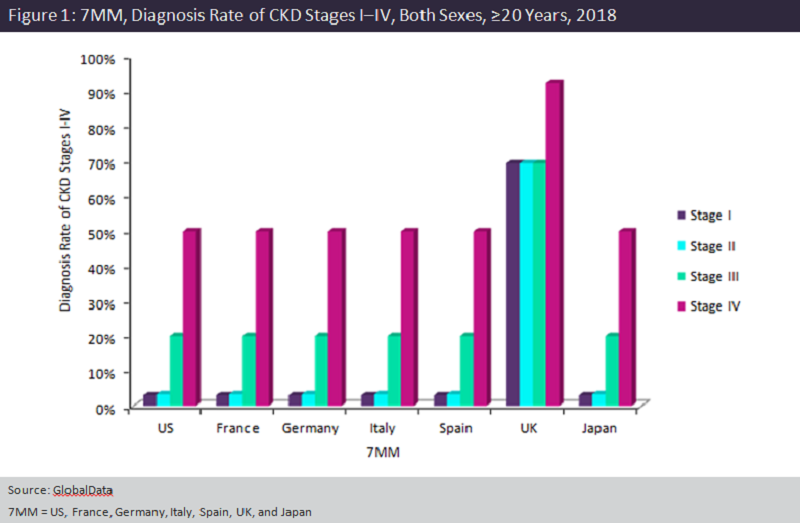Market insight in association with
Predicting the risk of chronic kidney disease with real-world data
A collaboration between Roche and IBM has led to the development of a new algorithm that uses real-world data (RWD) to predict the risk of chronic kidney disease (CKD) in patients with diabetes.
The companies, along with Eli Lilly, the Regenstrief Institute, and the Indiana Bioscience Research Institute, conducted a study comparing algorithms using clinical and RWD to calculate the risk of CKD. The study results were recently published in the journal Nature Medicine, which reported that the new algorithm performed better than published algorithms.
The data from the study suggest that RWD and predictive analytics could be used to help recognise the risk of CKD. With a low diagnosis rate of CKD Stages I–IV in both men and women, there is a need to increase early diagnosis of CKD, which the new algorithm may be able to do.
Figure 1 below shows the low diagnosis rate of CKD for the seven major markets (7MM: US, France, Germany, Italy, Spain, UK, and Japan), especially in the early stages. GlobalData epidemiologists estimate that the low diagnosis rate will continue through 2026 unless there are more effective ways to diagnosis CKD.
The low diagnosis rate means that there are a high number of people with CKD who are not diagnosed and not receiving treatment. Without proper treatment, CKD can lead to end-stage kidney disease, which can be fatal without a kidney transplant or dialysis.

The National Institutes of Health has reported diabetes as the leading cause of kidney disease. GlobalData epidemiologists have reported that there are a number of risk factors of CKD that are shared with other diseases such as diabetes, hypertension and cardiovascular disease. Such risk factors include family history, ethnicity, age, obesity, diabetes, hypertension, anemia and ischemic heart disease.
With the additional help of RWD to identify the risk of CKD in diabetes patients, early preventive treatment can lead to a lower risk of developing CKD. Although there are a few issues with RWD, such as quality, completeness and uniformity, RWD can serve as a useful complement to clinical trial data to provide additional real-world evidence and to promote effective interventions.
The development of a new algorithm between Roche and IBM demonstrates that combining multiple data resources and working with partners can advance prevention and treatment of CKD, and possibly other diseases.
For more insight and data, visit the GlobalData Report Store.